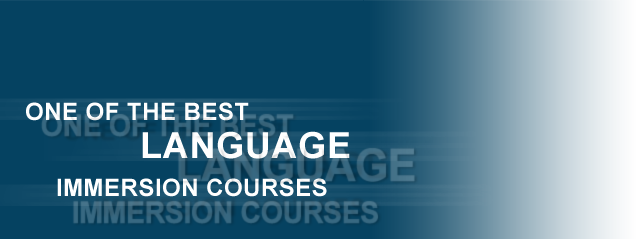DialoguE Journal 2000-2001
The Optimum Way to Learn a Language
|
N°9 |
 |
2000/2001 |
|
ONE-TO-ONE COURSES WHERE THE LANGUAGE IS SPOKEN |
||
|
Meilleurs Voeux
|
"DialoguE, one of the best
language programs"
[The Wall Street Journal] Deutsch - English - Español - Français - Nederlands |
|
Richard H. Zahm (Other testimonials at www.dialogue-languages.com) |
|
French in Spa, Spanish in Barcelona, Dutch
in Knokke, and our recently added programs for German and
English. In just a few years the DialoguE approach
has become the standard for communication in general and languages
in particular. Students avidly attest that a week at DialoguE is
the equivalent to a full year of old-style language training. The
Wall Street Journal in 1997 called DialoguE one of the best methods
on the market. DialoguE owes this success to its optimization of
the language learning process.
|
|
De-schooling In order to optimize language training, you’ve got to break with tradition. The learner, not the instructor, must function as the center of the process. True training works by adapting to the learner, to his or her cognitive style, priorities, needs, and centers of interest.
It’s hardly worth it to learn without gaining confidence; actual performance will leave much to be desired. Self confidence, the key to all learning, yields miracles, even the seemingly impossible. De-schooling also calls for allowing the learner to take errors in stride, without guilt. Trial and error provides a tremendous learning opportunity.
Making learners masters of their training and giving them the means to rapidly become independent is one of the major priorities of the DialoguE trainer. To become effective, one must rapidly learn to use linguistic tools without help from the trainer. The DialoguE trainer guides and develops potentialities. He helps the learner implement the learner’s own strategies for learning, to make his or her own progress, and enjoy the process. |
The School Method |
DialoguE’s De-schooled Method |
Standard training methods |
Training is individualized and personalized |
Failure is acceptable |
Failure is unacceptable and unjustifiable |
Psychological aspects rarely considered |
Self confidence is a primary objective |
Little stress on productivity and real-world use of the language |
Training at all times focuses on productivity and real-world applications. |
Satisfaction with average results |
Maximum progress with minimal expenditure of time and energy |
Dictatorial system – instructions |
Participatory system – cooperation |
The trainer and learner compete |
The trainer and learner work as a team |
The trainer tries to make the learner perfect |
The trainer makes the learner effective |
The learner must adjust to the trainer |
The trainer adjusts to the learner |
The trainer fixes objectives and priorities |
The learner fixes objectives and priorities |
The trainer directs, prompts, demands |
The trainer guides, accompanies, facilitates |
The trainer controls |
The learner learns to self-evaluate |
Mistakes are negative, even "sins" |
Errors are seen as positive conditions to progress |
The trainer assigns too much material |
The learner covers what he or she needs to know |
The trainer defines the tasks to accomplish |
The learner defines the tasks to accomplish |
The trainer develops what the learner should know |
The trainer develops the learner’s skills and confidence |
The trainer unconsciously renders the learner dependent on the trainer and the training |
The trainer gives autonomy to the learner and teaches the learner how to use linguistic tools effectively |
The learner learns only during lessons |
The learner learns constantly |
All too often, the trainer subverts the learner’s efforts |
The learner participates cooperatively in the experience |


